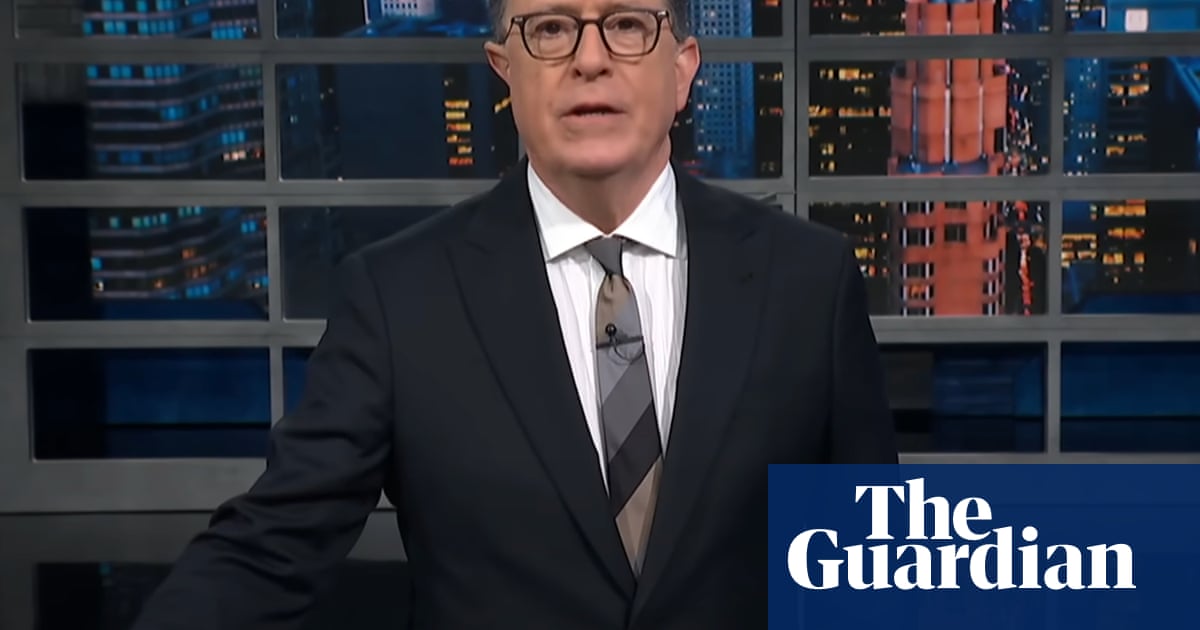Late-night hosts mocked corruption inDonald Trump’s presidency after hisfirst international visitto Saudi Arabia andacceptance of a $400m luxury plane from Qatar.
Trump made the first international trip of his second term on Tuesday, to Saudi Arabia. “A president visiting Saudi Arabia on his first official trip is a bit unusual,” saidStephen Colberton the Late Show. “Normally, back when we had normal, presidents would make their first international trip to the UK or Canada or any close ally.
“But like everything, Trump’s decision seemed to come down to a highest-bidder approach,” Colbert continued. As Trump said in March: “Last time I went to Saudi Arabia, they put up $450m …”
Colbert broke out his Trump impression: “OK, I’m going around the palace with a big bag. C’mon, just drop your bribe right in. Qatar gave me a jet – can you beat a jet?”
On Tuesday, Trump received a lavish welcome in Riyadh, where he was escorted by Crown Prince Mohammed bin Salman to a McDonald’s semi truck. “Of course, one of the most rewarding things about traveling the globe is getting the chance to sample the local nugget truck,” Colbert joked.
The crown prince, Colbert reminded, ordered the murder and dismemberment of the Washington Post columnist and Saudi dissident Jamal Khashoggi in 2018. Trump, however, was unabashed: “I like him a lot. I like him too much, that’s why we give so much, you know? I like you too much.”
Or as Colbert translated via Trump impression: “You’re like the son I never had.”
On Late Night,Seth Meyersreacted to a statement from Trump that he was “thinking of flying over” to Turkey to join Vladimir Putin and Volodymyr Zelenskyy for peace talks over the Russian invasion of Ukraine.
“Oh, were you?” Meyers said. “OK, I guess let us know. These are peace talks to prevent the escalation of a war in Europe and you’re treating it like it’s your neighbor grilling – ‘Oh, maybe I’ll come by, you’re not doing veggie burgers are ya?’”
During a press conference on Monday, Trump said that if China had signed a trade deal during his first term, the Chinese “would be able to buy products that they’ve never been able to buy”.
“I’m sorry, you think they want stuff from us?” Meyers scoffed. “They have iPhones. We have cars that can’t get wet,” like the Tesla Cybertruck.
And on Sunday, Trump’s health and human service secretary, Robert F Kennedy Jr, shared photos of himself and his grandchildren swimming in a Washington creek that is contaminated with sewage and bacteria. “You know, I used to think it was crazy that he had a brain worm,” said Meyers. “But now I think it’s crazy that he’s only had one.”
And on the Daily Show, Jordan Klepper also recapped Trump’s first international trip to Saudi Arabia, Qatar and the United Arab Emirates. “You might be wondering: why did Trump pick these countries for his first foreign trip?” he said. “Well, there’s a strong geopolitical balance that – I’m fucking with you. Corruption!”
As Klepper noted, the Trump Organization has construction projects in each of the three countries. “I never thought I’d say this, but can’t these countries go back to something more constructive, like funding terrorism?
“But Donald Trump doesn’t see any of these ‘business conflicts’ as a problem,” he continued. “If anything, he’s taking conflicts to a new height,” with the acceptance of a luxury 747 jet worth $400m from the state of Qatar. The plane would serve as Air Force One, then allegedly be decommissioned and transferred to Trump’s presidential library once he leaves office.
“I think we can stop pretending that this plane will be transferred to his presidential library,” Klepper laughed. “This is like the news reporting your aunt is bringing her ‘good friend Linda’ to Thanksgiving.”
More pressingly, “apart from being a security concern and a potential bribe, it seems clearly unconstitutional to give the president a gift like this. But what do I know?” According to Trump’s attorney general, Pam Bondi, the gift is legally permissible as Trump is not giving Qatar anything in return – at least, in the first 36 hours.
It’s worth noting, though, that before becoming attorney general, Bondi worked as a foreign lobbyist for Qatar, earning $115,000 a month. “It looks bad,” Klepper joked, “but if you have to understand: that’s a lot of money, and money feels good to have and to spend. So now I get it.”
